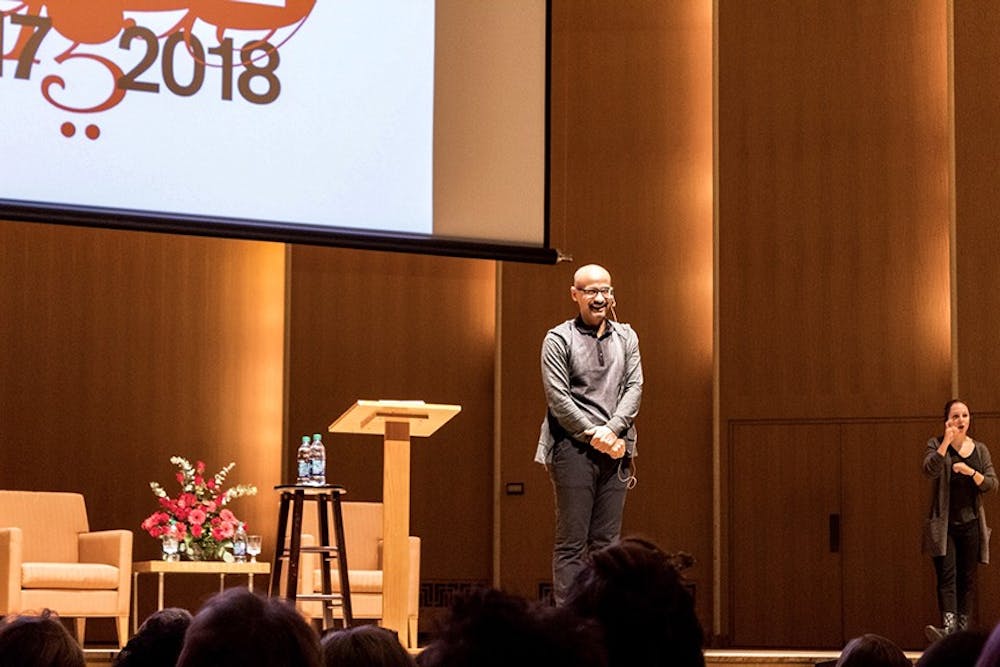Junot Díaz said immigrants are the mirror in which a nation sees its true self.
“We so desperately need immigrant voices. We need those voices because without the news that immigrants bring, our world will continue to die and sometime soon in the future, that will be our reality,” Díaz said. “The news which immigrants bring all of us could, if we listen, save us all, ... if only we would listen.”
Díaz, the final speaker in Just Buffalo Literary Center’s 2017-18 BABEL series, spoke to a sold-out crowd at Kleinhans Music Hall on Friday night. The Dominican-born author won the 2008 Pulitzer Prize for Fiction with his book, “The Brief Wondrous Life of Oscar Wao” and published his first children’s book “Islandborn” this year.
Díaz started the evening by asking audience members to raise their hand if they were immigrants, children of immigrants, people of African descent, Latino, Dominican or Carribean.
He introduced himself as an immigrant writer of African descent. Diaz said he often thinks about what it takes for someone like himself to become a writer.
“I [think about] what we, in some ways, have to disobey. The silences that we have to defy,” Díaz said. “I found myself having to deal with a number of challenges to become a writer. First and foremost, of course, there is a silence our society [puts] on people of color and on immigrants.”
Díaz said our society expects immigrants to not tell the truth about their experiences. This especially becomes a problem for writers, he said, as writers are all about pursuing some relationship with the truth.
“That mandate that society has toward immigrants, toward women, toward people of color, is stay silent about the reality of our experiences,” Díaz said. “That’s one of the essential mandates that you must disobey.”
One of the things immigrants have to overcome, Díaz explained, is the trauma of immigration.
“Trauma, as we all know, is the end of language, the great disruptor of language,” Díaz said. “Then, there is always the reality of overcoming the silences within you. You cannot become a writer unless you can be honest with yourself, no matter what the hell you’re writing about, even if you’re writing about werewolves.”
Díaz shifted the audience’s attention to his prepared speech on the dangers of gratitude, joking that he hates writing speeches. Díaz said immigration is a loss of culture, but when families come to the U.S., they are the recipients of a great gift.
“This is the positive myth of immigration, and this positive myth may for some be true, but whether this myth is pure fiction or partial fiction, it does not address the originary trauma,” Díaz said.
The author said “ungrateful” immigrants are told repeatedly to leave the U.S. if they don’t like it.
“This is not so much a suggestion as a not-so-veiled threat, a threat that immigrants themselves have already lost a country understand all too well,” Díaz said.
Gratitude, he said, is the absolute non-negotiable clause in an immigrant’s social contract in America. This clause encompasses all people of color, Díaz said, especially people of African descent and indigenous people.
But there is a contradiction, the author pointed out: if one offers gratitude and doesn’t extend any, it’s an example of unethical and exploitive behavior.
“For the United States to be grateful of its immigrants would require a reckoning with itself that it is clearly not prepared for,” Díaz said.
After his speech, Just Buffalo artistic director Barbara Cole conducted a Q&A session with Díaz.
Cole asked Díaz whether “The Brief Wondrous Life of Oscar Wao” should be considered magical realism. Díaz said it’s the “dumbest reading” of the book and joked that writers like him, who have a ‘z’ in their name, are immediately associated with “magical realism.”
Cole also asked Díaz how blackness is embraced in the Latino community and whether he was hesitant to address anti-blackness in his works.
“I fear bigger problems in the world than being embarrassed. Anti-blackness is one of them,” Díaz said. “It’s absolutely ubiquitous; it’s not monopolized by any particular group.”
Díaz said he grew up in the Dominican Republic, a country that came to modernity in an “anti-black, racial dictatorship.”
“For me, anti-blackness that I found present in the Dominican community did not do anything than link me to the rest of the African diaspora,” Díaz said.
“Certainly, it’s not monolithic in its intensity and formation, but it’s a challenge we all face. Exploiting the anti-blackness in the Dominican community is the only way we can begin to achieve some kind of healing and authenticity. I never saw it as something to be embarrassed about but [rather] a path to an integrated, whole self.”
Fans of Díaz’ writings praised his speech and Q&A on Friday night.
“Junot Díaz is the s--t. He speaks truth to power in the most authentic way that P.O.C. folks can substantiate and be proud of,” Rahwa Ghirmatzion said.
Elena Johnson, a senior English and African American Studies major, said Díaz was easygoing and related to everyone in attendance.
“In his books, when he was saying he has some words in Spanish that people don’t understand, he doesn’t translate it and you can look beyond that,” Johnson said.
“People don’t fully understand what others are talking about, but it’s more how you connect with people. So, I think he did a good job displaying that in his talk.”
Before the night ended, Cole revealed next year’s BABEL series, which includes Mohsin Hamid, Jesmyn Ward, Min Jin Lee and George Saunders. Early bird and VIP tickets are now available for the 2018-19 series.
Benjamin Blanchet is the senior features editor and can be reached at benjamin.blanchet@ubspectrum.comand @BenjaminUBSpecon Twitter.

Benjamin Blanchet is the senior engagement editor for The Spectrum. His words have been seen in The Buffalo News (Gusto) and The Sun newspapers of Western New York. Loves cryptoquip and double-doubles.





